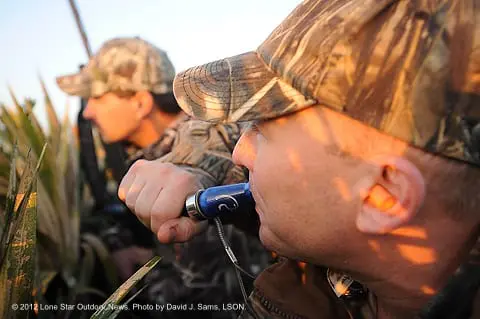 Early teal season is approaching quickly.
Early teal season is approaching quickly.
And the main duck season isn’t far behind.
Duck populations are at an all-time high. This coming waterfowl season ought to be a memorable one. Calling resident and migratory birds out of the sky requires practice.
Three basic calls will do the job to keep you in the duck calling game.
GREETING CALL
This is the call you make on first seeing ducks break on the horizon or in your sight plane. “Kanc, kanc, kanc, kanc, kanc-kanc-kanc” is the sound many of us use—steady and even, with 5 to 9 notes in tone-dropping order from higher to lower, as if to say: “Hey ducks. We’re ducks too. Come join us.”
Tip: Your decoy spread will do the rest during actual hunts to convince them visually once you turn those moving ducks your way (or should).
BASIC QUACK
Okay, the ducks have turned to your greeting call. Now it’s time to lay some quacks on those moving birds. Spacing between even notes is important here. Adjust it based on adding excitement to your calling. Your quacks should be made something like this: “Quack (pause a half- or full second between notes), quack (pause), quack (pause) quack and so on.” Listening to real birds is the best way to maintain cadence, tone, pitch and so forth with the quack call.
Tip: Raise your hands if you duck call while paused at traffic stop lights. It’s a great way to make use of commute time. Your Ducks Unlimited bumper stickers and others have already alerted bystanders to your obsession. No worries.
FEEDING CALL
Used sparingly, the feeding call can finish ducks you’ve turned with a greeting call and locked in with basic quacks. Think of it as a finishing call, with lowered volume, slightly choppy but also contented (imagine ducks eating).
Make it with the classic “Tooka, tooka, tooka, tooka-tooka-tooka . . .” Vary the way your tongue works the call as you blow it, working on the “took-a” sound before speeding it up during the actual calling. Practice by slapping your tongue against your palate.
Tip: You’ve turned the moving ducks. They’re coming. Let that duck call drop on your lanyard and get ready to shoot. Many times we fall in love with our own calling. Sometimes we should just shut up.

